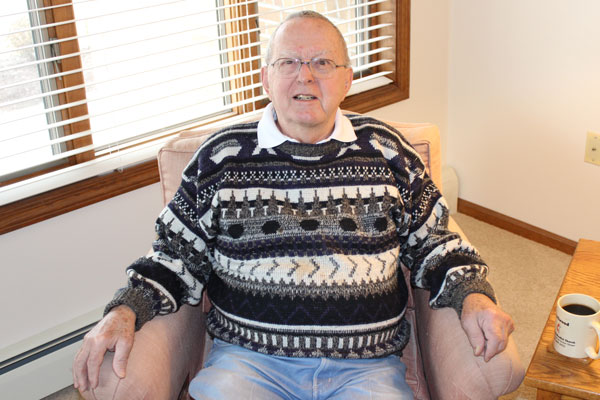
Nearly 70 years along, Lynn Blocher’s football days have withstood the embroidery time sometimes confers on a man’s memory.
And so Blocher, Class of ’55, merely chuckles when you ask what his clearest memories are of football for Manchester College. He has two of them, he says, and he embellishes neither.
“One, I got hurt,” says Blocher, who played halfback for Manchester from 1950 to ’52. “One, I got off a 65-yard punt.”
Another quiet chuckle.
“Pretty good kick, for those days. For me.”
He got hurt his sophomore year, when he got hit running the ball and his knee went sideways, chipping a bone and costing him most of the rest of the season. Two years later he was involved in a car accident and was unconscious for two weeks. That cost him his senior year.
It did not, however, cost him his lifelong devotion to Manchester, where he remembers the lifelong friendships he made and the personal commitment to his success from his teachers and professors.
“You got to know everybody (at Manchester),” Blocher says. “And the professors were friendly and were looking out for our best interests.”
After graduating with a degree in chemistry, Blocher worked 30 years as a rubber compound development engineer at General Motors in Dayton, Ohio. When he retired from there, he moved to Detroit to become a troubleshooter for another company.
But he never forgot his days at Manchester. Which is why, 65 years after graduation, he’s been a loyal supporter of the multipurpose athletic stadium initiative, which will include an all-weather turf football field, Olympic-sized track, concession stands and press box.
“Good facilities attract good student-athletes. Good student-athletes help produce good results. Good results produce positive self-images. Good self-images help to produce a good society,” he says.
For Blocher, it’s simply a matter of doing for future generations of Manchester students what was done for him.
“I think obviously somebody had given money,” he says. “My tuition obviously wasn’t paying for all the costs associated with my education. I was using somebody else’s money, so it’s our obligation – my obligation, I feel – to do the same thing for somebody else who’s coming along behind me and is needing help.”
By Benjamin Smith